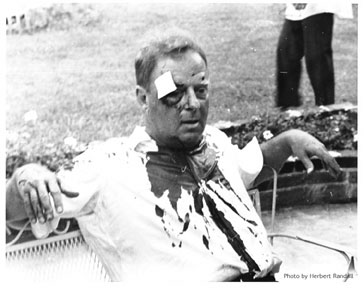
 |
||
|
|
|
|
|
|
||

Photo: “Lelyveld beating,”
by Herbert Randall, 1964
Provided by the McCain Library and Archives, University of Southern Mississippi
Reprinted with permission of Herbert Randall
STATEMENTS OF DISCIPLINE OF NONVIOLENT MOVEMENTS
The purpose of this material is to stimulate discussion of the values and practices of the movement. Is the movement the germ of a new society? Would we want a whole society in which people related to each other as they do in the movement?
I. Student Nonviolent Coordinating Committee Statement of Purpose:
We affirm the philosophical or religious ideal of nonviolence as the foundation of our purpose, the presupposition of our faith and the manner of our action. Nonviolence as it grows from the Judeo-Christian tradition seeks a social order of justice permeated by love. Integration of human endeavor represents the crucial first step toward such a society.
Through nonviolence, courage displaces fear; love transforms hate. Acceptance dissipates prejudice; hope ends despair. Peace dominates war; faith reconciles doubt. Mutual regard cancels enmity. Justice for all overcomes injustice. The redemptive community supersedes systems of gross social immorality.
Love is the central motif of nonviolence. Love is the force by which God binds man to himself and man to man. Such love goes to the extreme; it remains loving and forgiving even in the midst of hostility. It matches the capacity of evil to inflict suffering with even more enduring capacity to absorb evil, all the while persisting in love.
By appealing to conscience and standing on the moral nature of human existence, nonviolence nurtures the atmosphere in which reconciliation and justice become actual possibilities.
II. CORE Rules for Action (excerpts)
1. Investigate the facts carefully before determining whether or not racial injustice exists in a given situation.
2. Seek at all times to understand both the attitude of the person responsible for a policy of racial discrimination, and the social situation which engendered the attitude. Be flexible and creative, showing a willingness to participate in experiments which seem constructive, but being careful not to compromise CORE principles.
3. Make a sincere effort to avoid malice and hatred toward any group or individual.
4. Never use malicious slogans or labels to discredit any opponent.
5. Be willing to admit mistakes.
6. Meet the anger of any individual or group in the spirit of good will and creative reconciliation; submit to assault and do not retaliate in kind either by act or word.
7. Never engage in action in the name of the group except when authorized by the group or one of its action units.
8. When in action obey the orders issued by the authorized leader or spokesman of the project. Criticism (may be referred later) back to the group.
III. Staff decorum suggested for SNCC SW Georgia Project:
(1) There will be no consumption of alcoholic beverages.
(2) Men will not be housed with women.
(3) Romantic attachments on the level of ‘girl-boy friend relations’ will not be encouraged within the group.
(4) The staff will go to church regularly.
(5) The group shall have the power of censure.
(also discussed in Unit VII):
Having, after due consideration, chosen to follow without reservation, the principles of nonviolence, we resolve while in prison:
* to practice nonviolence of speech and thought as well as action;
* to treat even those who may be our captors as brothers;
* to engage in a continual process of cleansing of the mind and body in rededication to our wholesome cause;
* to intensify our search for orderly living even when in the midst of chaos.
V. From the Discipline of the San Francisco-to-Moscow Walk:
General statement. The purpose of the Walk is to appeal to the mind and conscience of the American people. It is also a part of a nonviolent philosophy to have respect for all human beings and to seek to communicate with them, not to put up barriers between them and ourselves. It is recognized that dress, manners, ways of speaking, etc., of the Team members have a bearing on the impact, emotional, intellectual and spiritual, which they make on those with whom they come into contact on the Walk.
We do not think any committee is in a position to lay down detailed rules on such subjects and in any case sensitivity in our relations to persons and commitment to the project and the way of nonviolence constitute the only true source of right action in these matters.
Specifics Our attitude toward officials will be one of sympathetic understanding of the burdens and responsibilities they carry.
No matter what the circumstances or provocation, we will not call names, make hostile remarks, nor respond with physical violence to acts directed against us.
We will adhere as closely as we are able to the letter and spirit of truth in our spoken and written statements.
We will always try to speak to the best in all men, rather than seeking to exploit their weaknesses to what we may believe is our advantage.
Epilogue: (ask students if this sums up the foregoing): “The revolution is a need of being no longer alone, one man against another; it is an attempt to stand together and be afraid no longer . . .” (Ignazio Silone)
The document is from:
SNCC, The Student Nonviolent Coordinating Committee Papers, 1959-1972 (Sanford, NC: Microfilming Corporation of America, 1982) Reel 67, File 340, Page 0797.
The original papers are at the King Library and Archives, The Martin Luther King Jr. Center for Nonviolent Social Change, Atlanta, GA